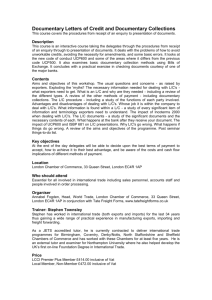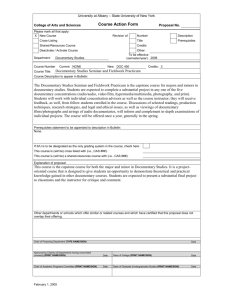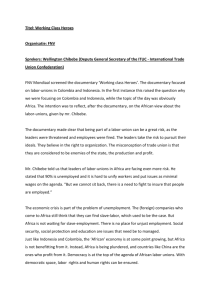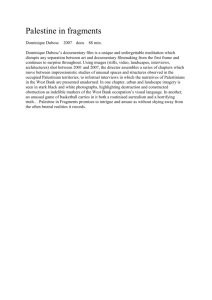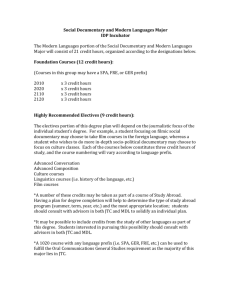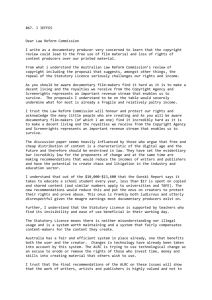Qualification Specification (2015-2016) Level 4 Certificate
advertisement
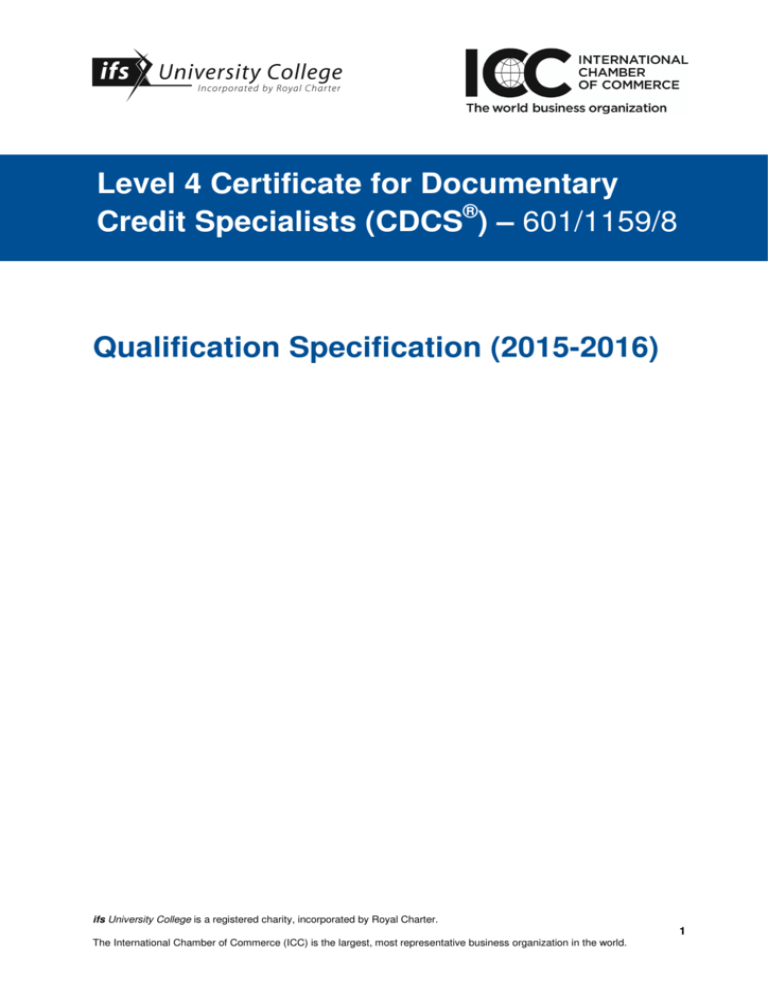
Level 4 Certificate for Documentary Credit Specialists (CDCS®) – 601/1159/8 Qualification Specification (2015-2016) ifs University College is a registered charity, incorporated by Royal Charter. 1 The International Chamber of Commerce (ICC) is the largest, most representative business organization in the world. RATIONALE A Qualification Specification is a concise description of a qualification offered by ifs University College and provides information to all stakeholders, including potential and current students. All qualifications offered by ifs University College are validated and regularly reviewed, based on information set down in each qualification specification. CONTENTS Page 1. Accreditation information 3 2. Learning hours 4 3. Aims of the CDCS 4. Skills developed through the CDCS 5. Objectives of the CDCS 6 6. Structure of the CDCS ® 6 7. Entry requirements 6 8. Methods of study ® 4 ® 5 ® 7 ® 9. Assessment methodology of the CDCS 7 10. Grading 7 11. Assessment resits 8 12. Learning resources 8 13. Syllabus 8 ifs University College is a registered charity, incorporated by Royal Charter. 2 The International Chamber of Commerce (ICC) is the largest, most representative business organization in the world. 1. 1 Accreditation information Qualification title Level 4 Certificate for Documentary Credit Specialists ® (CDCS ) Ofqual qualification number 601 / 1159 / 8 Qualification level 4 European Qualifications Framework (EQF) level 5 Regulation start date 29 August 2014 Operational start date 01 October 2014 Offered in England, Wales, Northern Ireland and internationally Assessment available in English Yes Assessment available in Welsh No Assessment available in Irish No Sector subject area 15.1 Accounting and Finance Purpose D. Confirm occupational competence and / or ‘licence to practice’ Sub-purpose D1. Confirm competence in an occupational role to the standards required Total credits 30 Minimum credits at / above level 30 Minimum learning hours 150 Maximum learning hours 300 Overall grading type Fail / Pass / Distinction Assessment methods Multiple-choice examination Qualification description The Certificate for Documentary Credit Specialists consists of two mandatory units. Age ranges 16–18; 19+ 1 150 guided learning hours for those students resitting the qualification as part of their recertification. ifs University College is a registered charity, incorporated by Royal Charter. 3 The International Chamber of Commerce (ICC) is the largest, most representative business organization in the world. 1.1 Table 1 QCF Level 4 level descriptors DESCRIPTION SUMMARY Achievement at Level 4 reflects the ability to identify and use relevant understanding, methods and skills to address problems that are well defined but complex and non-routine. It includes taking responsibility for overall courses of action as well as exercising autonomy and judgement within fairly broad parameters. It also reflects understanding of different perspectives or approaches within an area of study or work. KNOWLEDGE AND UNDERSTANDING Use practical, theoretical or technical understanding to address problems that are well defined but complex and non-routine. Analyse, interpret and evaluate relevant information and ideas. Be aware of the nature and scope of the area of study or work. Have an informed awareness of different approaches within the area of study or work. APPLICATION AND ACTION Address problems that are complex and non-routine while normally fairly well defined. Identify, adapt and use appropriate methods and skills. Initiate and use appropriate investigation to inform actions. Review the effectiveness and appropriateness of methods, actions and results. AUTONOMY AND ACCOUNTABILITY Take responsibility for courses of action, including, where relevant, responsibility for the work of others. Exercise autonomy and judgement within broad but generally welldefined parameters. 2. Learning Hours 2.1 The current recommended learning hours are 300 which, under Ofqual regulations, make ® CDCS a Certificate. 3. Aims of the CDCS® 3.1 The aims of the CDCS are to: ® i. introduce students to documentary credit transactions by focusing on the types, products and processes used in transactions; ii. highlight the importance of rules, standards and guidelines for documentary credit transactions and the products available to assist these transactions; iii. enable students to gain an appreciation of the commonly used documents and trade terms; iv. provide students with an understanding of the roles, obligations and relationships between parties to documentary credits; ifs University College is a registered charity, incorporated by Royal Charter. 4 The International Chamber of Commerce (ICC) is the largest, most representative business organization in the world. v. provide an understanding of the risks involved in documentary credit transactions and the ability to manage those risks; vi. familiarise students with how the rules and guidelines can be breached and the implications of such breaches; vii. provide students with the ability to manage documentary credit transactions and the relationship between parties using the transactions; viii. provide students with an understanding of how to check the accuracy of documents to enable their correct usage in documentary credit transactions; ix. familiarise students with the links between theory and practice; and, x. provide opportunities for students to develop the necessary skills and competencies to move on to further study or employment. 4. Skills developed through the CDCS® 4.1 Knowledge and understanding elements of the CDCS will provide students with the ® ability to critically analyse the: i. environment of documentary credits, with a focus on the trade terms, products and processes; ii. roles and responsibilities of parties involved in documentary credits; iii. current technical language, tools, methods and practices of documentary credits; iv. risks involved in documentary credits and how to mitigate them; and, v. 4.2 rules and regulations involved in documentary credit products. ® Subject-specific practical / professional elements of the CDCS will provide students with the skills to: i. use appropriate tools and methods to check documentary credit documents; ii. apply appropriate rules and guidelines to a variety of documentary credit transaction scenarios; iii. analyse documentary credit products and documents and reflect upon their desirability and effectiveness in a variety of scenarios; and, iv. understand the problems and risks that can arise in documentary credit transactions, and how these problems can be controlled and / or mitigated. 4.3 ® Intellectual skills developed by the CDCS will provide students with the ability to: i. locate, extract and analyse information from different sources; ii. apply higher-level cognitive skills of reflective practice, including analysis and evaluation; iii. utilise problem-solving and decision-making skills; and, iv. understand the interrelationships between the various subject disciplines and assimilate these coherently to provide effective solutions. ifs University College is a registered charity, incorporated by Royal Charter. 5 The International Chamber of Commerce (ICC) is the largest, most representative business organization in the world. 4.4 ® Transferable skills and personal qualities developed by the CDCS will provide students with the ability to: i. use appropriate information from a range of sources; ii. learn independently and enhance skills of self-reflection, criticality and self-managed study; and, iii. structure and communicate ideas logically and coherently. 5. Objectives of the CDCS® 5.1 On completion of the CDCS qualification, students will be able to: ® i. demonstrate a level of expertise in documentary credits that is recognised worldwide; ii. improve their knowledge and understanding of the complex issues associated with documentary credit best practice; iii. develop the skills to apply their knowledge in the workplace and to perform at a high level; ® iv. use the professional designation CDCS ; and, v. 5.2 improve their career and promotion prospects. ® As well as developing knowledge, the CDCS assists in developing the ability to: i. analyse and evaluate information; ii. develop core personal skills including communication, numeracy and IT; iii. formulate appropriate responses to resolve defined problems; iv. convey information clearly, concisely and accurately; v. structure information, options and recommendations in a clear and logical order; vi. develop skills in examination technique; vii. apply and build on previous learning and experience; and, viii. develop critical thinking and critical evaluation. 6. Structure of the CDCS® 6.1 CDCS is made up of one mandatory unit which needs to be successfully completed in order ® for the student to achieve the certificate: i. Principles and Practices of Documentary Credit Transactions 7. Entry requirements 7.1 There are no specified entry requirements. However, individuals need to be satisfied of their ability to study in English at Level 4. ifs University College is a registered charity, incorporated by Royal Charter. 6 The International Chamber of Commerce (ICC) is the largest, most representative business organization in the world. 8. Methods of study 8.1 CDCS is delivered via distance learning. 8.2 Materials and additional information are available by accessing my ifslearning. 9. Assessment methodology of the CDCS® 9.1 The unit is assessed in a single examination lasting three hours. The examination paper is split ® into two sections. 9.2 Section A is assessed by 60 multiple-choice questions, with one mark available for each correct answer. 9.3 Section B is assessed by: i. 10 multiple-choice questions, with one mark available for each correct answer. ii. Three in-basket exercises comprising five multiple-choice questions linked to a set of documents, with one mark available for each correct answer. iii. Three simulation document-checking exercises, candidates must identify five discrepancies from a choice of 10. Each discrepancy correctly identified is worth one mark. A total of five marks are available for each simulation exercise. 9.4 A total of 100 marks are available. 10. Grading 10.1 The qualification will be graded fail / pass / distinction : 2 Grade 10.2 Raw mark Fail 0–69 Pass 70–94 Distinction 95–100 To achieve an overall pass, students must achieve a mark of 70% overall (and 60% for Section B). 10.3 There is no section pass mark for Section A. 10.4 Credit cannot be claimed for gaining 60% in Section B but failing to gain 70% overall, only overall achievement is graded. 2 The pass mark / grade bands are reviewed each examination session to ensure fairness to students in cases where examination difficulty varies. Adjustments may be made accordingly. ifs University College is a registered charity, incorporated by Royal Charter. 7 The International Chamber of Commerce (ICC) is the largest, most representative business organization in the world. 11. Assessment resits 11.1 Students are allowed to resit the unit in accordance with the published ifs policies. 12. Learning resources 12.1 Students will be provided with the following learning resources: i. online access via my ifslearning to learning materials and to ifs KnowledgeBank (virtual library); ii. unit syllabus; iii. student handbook; iv. study text; v. specimen paper; and, vi. student-led forum. 13. Syllabus 13.1 Specification Unit title Principles and Practices of Documentary Credit Transactions Ofqual unit reference number K / 506 / 0499 Unit level 4 Learning hours 300 Unit credit value 30 Unit aims i. This unit introduces students to documentary credit transactions by focusing on the types, products and processes used in transactions. ii. It highlights the importance of rules, standards and guidelines for documentary credit transactions and the products available to assist these transactions. iii. Students will gain an appreciation of the commonly used documents and trade terms. iv. Students will gain an understanding of the roles, obligations and relationships between parties to documentary credits. v. Students will gain an understanding of the risks involved in documentary credit transactions and be able to manage those risks. vi. Students will understand how the rules and guidelines can be breached and the implications of such breaches. vii. Students will be able to manage documentary credit transactions and the relationship between parties to the transactions. viii. Students will understand how to check the accuracy of ifs University College is a registered charity, incorporated by Royal Charter. 8 The International Chamber of Commerce (ICC) is the largest, most representative business organization in the world. documents to enable their correct usage in documentary credit transactions. 13.2 Unit 1 learning outcomes / assessment criteria Learning outcome (LO) Assessment criteria (AC) The learner when awarded credit for this Assessment of the LOs will require a learner to demonstrate that unit will: they can: 1.1 Distinguish between the different types of payment method and credit, the roles and obligations of parties involved and the 1. Be able to utilise the rules relating to documentary credits and understand documents and related products used in documentary credit the features, documents, life cycle, and transactions. 1.2 Apply the rules, standards, guidelines and trade terms used in and the roles of the various parties to a credit. identify the risks and problems that can affect documentary credit transactions. 2.1 Apply appropriate rules and trade terms to the management of documentary credit transactions. 2. Be able to manage documentary credit 2.2 Check the accuracy of documents used in documentary credit transactions and associated risks. transactions. 13.3 Unit 1 syllabus overview Learning Outcome Syllabus Main types, characteristics and uses of documentary credits: • Understanding of the term documentary credit • A basic documentary credit transaction (including generic flow chart of this process) 1. • Types of documentary credit • Primary characteristics of documentary credits • Secondary characteristics of documentary credits: - Revolving credits rules, documents and - Instalment parties to documentary - Advance payments credit transactions and how - Transferable - Evergreen - Clean - Direct pay Know the features, life cycle, they are applied. • Categorisation of documentary credit by type and characteristic • Commercial documentary credits • Standby letters of credit Roles and obligations of the parties to documentary credit transactions and ifs University College is a registered charity, incorporated by Royal Charter. 9 The International Chamber of Commerce (ICC) is the largest, most representative business organization in the world. Learning Outcome Syllabus the relationships between them: • • • Parties to documentary credits roles and responsibilities: - Issuing bank - Beneficiary - Applicant - Non-bank issuers - Confirming bank - Advising bank - Negotiating bank - Paying bank - Accepting bank - Reimbursing bank - Transferring bank - Nominated bank - Presenting bank Banks roles and obligations: - Issuing bank - Confirming bank - Advising bank - Negotiating bank - Paying bank - Accepting bank - Reimbursing bank - Transferring bank - Nominated bank - Presenting bank - Beneficiary Relationship of parties in respect of payment of conforming documents and non-payment of non-conforming documents • Roles and responsibilities in reimbursement Types and methods of payment and credit used in documentary credit transactions: • Types of payment: - Sight - Deferred - Negotiation ifs University College is a registered charity, incorporated by Royal Charter. 10 The International Chamber of Commerce (ICC) is the largest, most representative business organization in the world. Learning Outcome Syllabus - Acceptance • Transmission of proceeds • Types of credit • With and without recourse • The autonomy of a documentary credit as a payment mechanism Types of transport, commercial and financial documents used in documentary credit transactions and their requirements under ICC rules: • Characteristics, processing and rules that apply to transport documents: - Bill of Lading - Charter Party Bill of Lading - Non-negotiable Seaway Bill - Multimodal Transport Document - Air Transport Document - Road, Rail or Inland Waterway Transport Document - Forwarder’s Cargo receipt, Mate’s Receipt and Consolidator’s Receipt • • - Post Receipt or Certificate of Posting - Courier or Expedited Delivery Service Document Financial and Commercial documents: - Draft / bill of exchange - Commercial Invoice - Insurance Document - Weight Certificate - Certificate of Origin - Packing Lists - Inspection Certificate Documents for official purposes and checking mechanisms The related products used in documentary credit transactions: • Letter of Indemnity • Air Way Release • Shipping Guarantee • Assignment of Proceeds • Participation and Syndication • Refinance Credits ifs University College is a registered charity, incorporated by Royal Charter. 11 The International Chamber of Commerce (ICC) is the largest, most representative business organization in the world. Learning Outcome Syllabus • Reimbursement undertaking Industry rules, standards, guidelines and trade terms that govern the delivery of documentary credit transactions: ® • Incoterms 2010 • UCP 600 – Uniform Customs and Practice for Documentary Credits • ISP98 – International Standby Practices • URR 725 – Uniform Rules for bank-to-bank reimbursement under documentary credits ICC decision on original documents (Appendix to ICC publication 645 – • ISBP) • ISBP 745 • eUCP The ways in which documentary credit transaction rules and regulations can be breached and the implications of such breaches. Including: • Money Laundering • Sanctions • Terrorist Financing The processes and challenges involved in documentary credit transactions: • Processes and activities associated with: - Sales agreement / contract of sale - Issue - Pre-advise - Advise - Confirm - Amend - Transfer - Present - Examine - Pay / Reject - Claim - Reimburse Funds - Cancel • Presentation, Examination and Settlement / Rejection • Identifying and handling discrepant documents • Electronic presentations ifs University College is a registered charity, incorporated by Royal Charter. 12 The International Chamber of Commerce (ICC) is the largest, most representative business organization in the world. Learning Outcome Syllabus • Problems that can arise during the documentary credit transaction process The risks involved in documentary credit transactions. • • • • 2. Be able to manage documentary credit transactions. 13.4 Types of Risk - Operational / UCP 600 - Credit - Foreign Exchange - Fraud - Legal - Political Other risks / considerations - Money Laundering - Sanctions - Terrorist Financing - Credit Risk Assessment / Management Risks to the parties to documentary credits: - applicant - issuing bank - beneficiary - advising bank - nominated bank - confirming bank - reimbursing bank How risks can be controlled Apply and analyse the transport, commercial and financial documents used in documentary credit transactions in order to recommend appropriate courses of action and manage documentary credit transactions. ® CDCS assessment methodology The assessment will have two sections: • Section A – 60 multiple-choice questions. This component of the examination is worth 60 marks. ifs University College is a registered charity, incorporated by Royal Charter. 13 The International Chamber of Commerce (ICC) is the largest, most representative business organization in the world. • Section B – 10 multiple-choice questions, three in-basket exercises each with five attached multiple-choice questions and three simulation exercises where five discrepancies need to be identified from a choice of 10. This component of the examination is worth 40 marks. • The examination will be worth a total of 100 marks. • Students must achieve 70% of the total 100 marks available to pass the qualification (and 60% for section B). • Credit cannot be claimed for gaining 60% in section B but failing to gain 70% overall, only overall achievement is graded. ifs University College is a registered charity, incorporated by Royal Charter. 14 The International Chamber of Commerce (ICC) is the largest, most representative business organization in the world. About the ifs University College ifs University College is the university for financial education. London-based, it is a registered charity incorporated by Royal Charter that exists to ensure a flow of talented individuals into the financial services industry and related sectors. Its qualifications enable individuals to reach their full professional potential and encourage appropriate and ethical practice. It also works to enhance the financial wellbeing of future generations through its unique personal finance qualifications and wider financial capability initiatives. ifs University College ifs House 4-9 Burgate Lane Canterbury Kent CT1 2XJ T: E: W: +44 (0) 1227 818609 (option 1) customerservices@ifslearning.ac.uk www.ifslearning.ac.uk About the International Chamber of Commerce The International Chamber of Commerce is the largest representative business organisation in the world. The ICC has hundreds of thousands of member companies across +130 countries covering interests spanning across every sector of private enterprise. The ICC Banking Commission is the largest commission within the ICC and is a leading ruling body for the banking industry globally, gaining a reputation for being the most authoritative voice in the field of trade finance. International Chamber of Commerce 33-43 avenue du Président Wilson 75116 Paris, France T: E: W: +33 (0) 1 49 53 28 28 icc@iccwbo.org www.iccwbo.org ifs University College is a registered charity, incorporated by Royal Charter. 15 The International Chamber of Commerce (ICC) is the largest, most representative business organization in the world.
